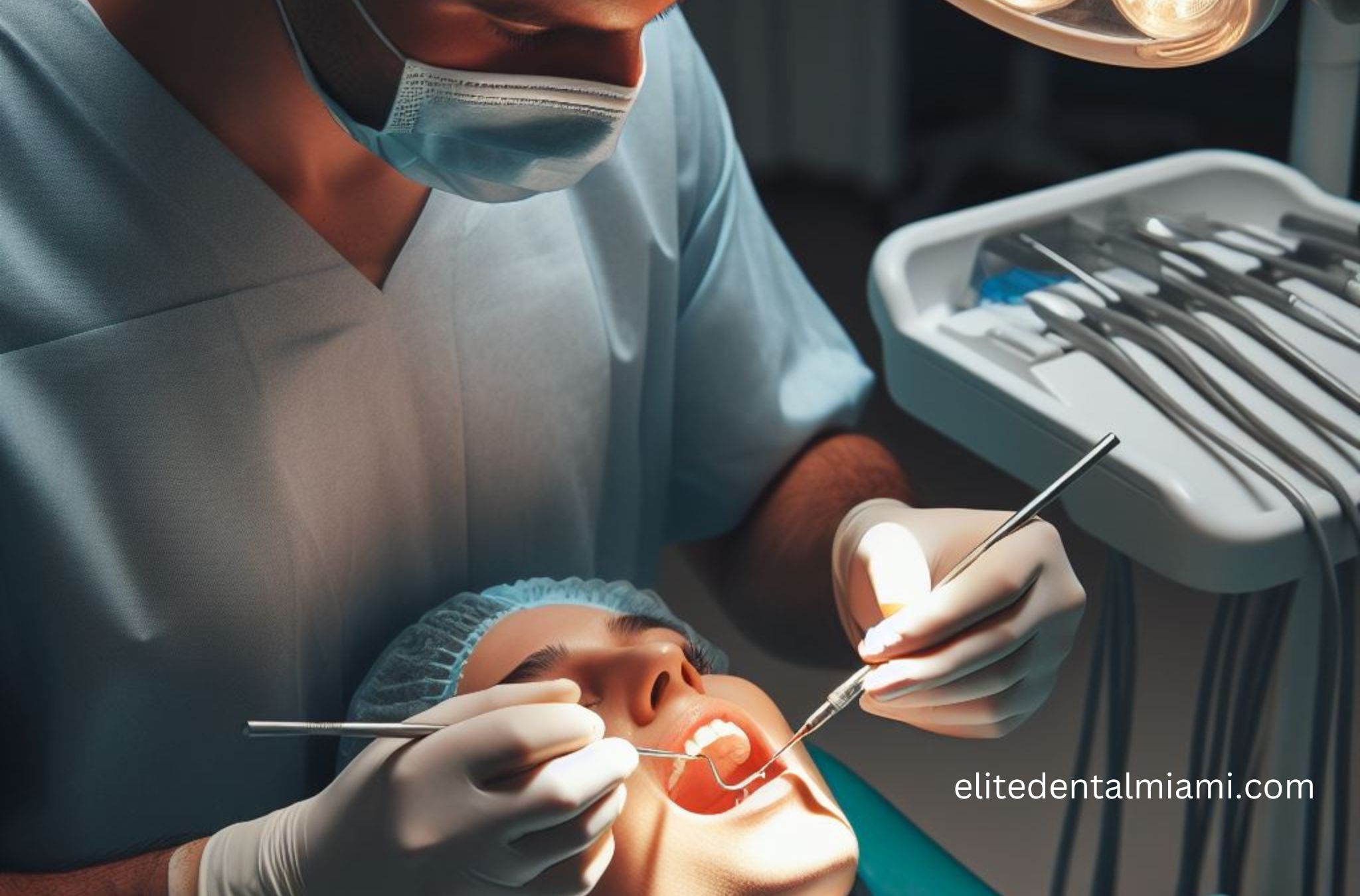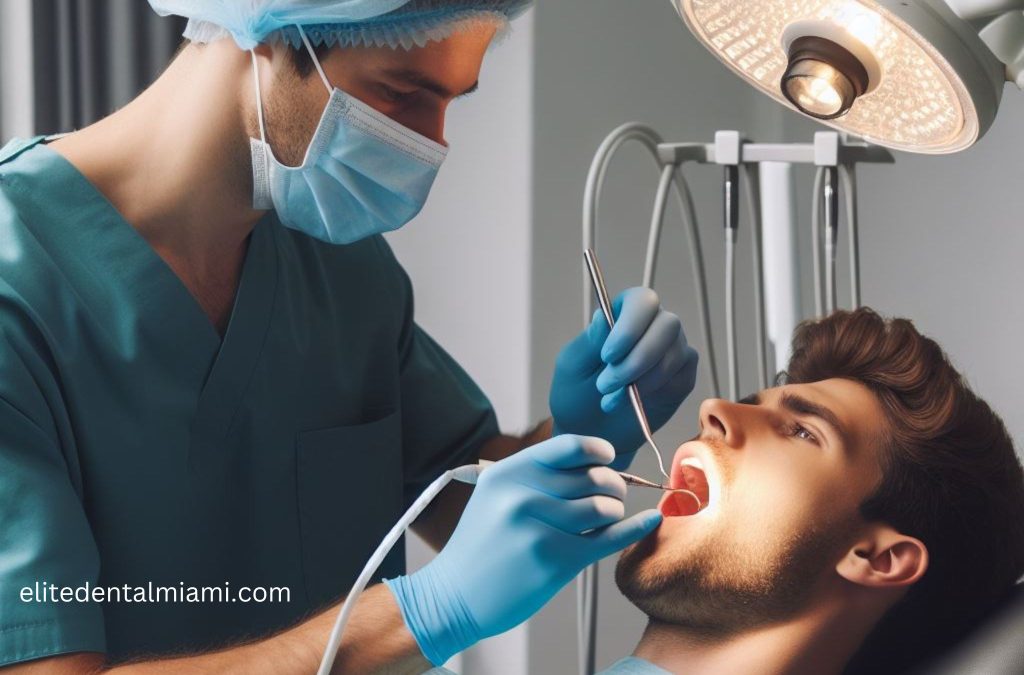Yes, you can Teeth Cleaned After Surgery . Now, I’m going to provide you with a more detailed explanation.
Oral hygiene is essential, especially after surgery, to prevent infections and promote healing. While you may experience some discomfort or sensitivity, a dental cleaning can be performed with modifications to suit your needs. Your dentist will evaluate your condition and make necessary adjustments to ensure a safe and comfortable cleaning experience.
With proper communication and precautions, you can maintain good oral health and keep your teeth clean post-surgery.

Importance Of Dental Hygiene After Surgery
Proper dental hygiene is always important, but it becomes even more crucial after surgery. Taking care of your teeth and gums can have a significant impact on your overall health and well-being. The mouth is a gateway to the body, and any infection or inflammation in the oral cavity can potentially spread to other parts of the body, including surgical sites. In this post, we will explore the importance of dental hygiene after surgery and how it can help prevent infection and promote faster healing.
Preventing Infection
Following surgery, your immune system might be compromised, making you more susceptible to infections. The mouth is home to a diverse range of bacteria, some of which can cause gum disease and tooth decay. If these bacteria are allowed to multiply and enter your bloodstream, they can potentially cause infections in surgical sites or other parts of the body.
To prevent infection, it is crucial to maintain good oral hygiene after surgery. This involves cleaning your teeth at least twice a day with a soft-bristled toothbrush and fluoride toothpaste. Be sure to clean both the front and back surfaces of your teeth, as well as your tongue and gums. Flossing should also be done daily to remove plaque and food particles from between your teeth.
In addition to regular brushing and flossing, using an antimicrobial mouthwash can help reduce the number of bacteria in your mouth and prevent the formation of plaque. Your dentist may also recommend an antibacterial mouthwash or an oral rinse to further minimize the risk of infection.
Promoting Healing
Dental hygiene plays a crucial role in promoting faster healing after surgery. When your teeth and gums are in good health, they provide a strong foundation for any surgical procedures. Proper oral care can help reduce the risk of complications, such as delayed healing, infection, and inflammation.
Besides brushing and flossing, maintaining a balanced diet rich in vitamins and minerals is essential for optimal healing. Foods high in calcium, vitamin D, and vitamin C can contribute to stronger teeth and gums and aid in the healing process. Additionally, staying hydrated by drinking plenty of water is vital for your overall oral health and healing.
Regular dental check-ups are also crucial for monitoring your oral health during the healing process. Your dentist can assess your progress, identify any potential issues, and provide appropriate treatment or recommendations if needed.
Overall, dental hygiene after surgery is of utmost importance for preventing infection, promoting healing, and ensuring a successful recovery. By maintaining good oral care practices, you can minimize the risk of complications, promote overall well-being, and enjoy a healthy, beautiful smile for years to come.

Credit: www.hillcountryoralsurgery.com
When Can I Get My Teeth Cleaned After Surgery?
After undergoing surgery, it is advisable to wait for a few weeks before getting your teeth cleaned. It is essential to consult with your dentist to determine the appropriate time for post-surgery dental care.
When it comes to post-surgery care, one aspect that often gets overlooked is dental hygiene. Many people wonder when they can get their teeth cleaned after surgery. The answer to this question depends on various factors, including the type of surgery you underwent. It is important to consult your surgeon and take into consideration their recommendations. Let’s explore in more detail the key considerations in determining when you can get your teeth cleaned after surgery.
Consulting Your Surgeon
Before scheduling a dental cleaning after surgery, it is crucial to consult your surgeon. They are the best person to provide guidance based on your specific case. They can assess your recovery progress and advise you on when it is safe to resume regular dental care. Connecting with your surgeon allows for an open dialogue, where you can ask questions and voice any concerns you may have.
Considering The Type Of Surgery
The type of surgery you had will influence when you can get your teeth cleaned. Some surgeries, such as major oral surgeries or jaw surgeries, may require a longer recovery time before dental cleaning can be performed. In these cases, it is essential to allow ample healing time for the surgical site before subjecting it to the cleaning process. Your surgeon will consider the specific procedure you underwent and provide recommendations accordingly.
Ensuring Proper Healing
The main concern when it comes to dental cleaning after surgery is ensuring that the surgical site has healed properly. Proper healing is crucial for preventing complications and ensuring a successful recovery. Your surgeon will monitor the healing progress and determine when it is safe for you to have your teeth cleaned.
It is essential to follow their instructions and wait until you receive the green light to avoid any potential complications. In conclusion, the timing of getting your teeth cleaned after surgery depends on various factors. Consulting your surgeon and considering the type of surgery are key in determining the appropriate time.
It is important to prioritize proper healing before subjecting the surgical site to dental cleaning procedures. By following the guidance of your surgeon, you can ensure a safe and effective dental care routine post-surgery.
Special Considerations For Different Dental Procedures
When it comes to dental procedures, proper aftercare is crucial for a successful recovery. Whether you have recently undergone a wisdom tooth extraction or a root canal treatment, it is important to understand the special considerations for each procedure. This will help you ensure optimum oral health and avoid any complications. Let’s explore the post-operative care required for these two common dental procedures.
Wisdom Tooth Extraction
Wisdom tooth extraction is a common dental surgery that involves the removal of one or more wisdom teeth. This procedure is often necessary when the wisdom teeth are impacted or causing problems such as pain, infections, or crowding. After the extraction, it is essential to follow the dentist’s instructions to promote healing and minimize discomfort. Here are some important points to bear in mind.
Post-operative care tips for wisdom tooth extraction
- Take the pain medicines supplied by your dentist as indicated.
- To prevent the blood clot from being dislodged, do not rinse your mouth for the first 24 hours following surgery.
- Apply a cold compress to the cheek to minimize swelling.
- Eat soft foods and avoid chewing on the extraction site.
- Brush your teeth lightly and avoid the surgery region.
- Avoid smoking and drinking alcohol, as they can delay healing.
Following these post-operative care tips will help ensure proper healing and minimize the risk of complications.
Root Canal Treatment
Root canal treatment, also known as endodontic therapy, is performed to save a severely infected or damaged tooth from extraction. During this procedure, the dentist removes the infected pulp and cleans the root canals before sealing them. Proper aftercare is essential to promote healing and preserve the treated tooth. Here are some special considerations for post-operative care:
Post-operative care tips for root canal treatment
- Take any prescribed antibiotics to prevent or treat infection.
- Avoid chewing on the treated tooth until the final restoration is complete.
- Continue with a regular oral hygiene routine, including brushing and flossing.
- Schedule a follow-up appointment with your dentist for a crown or filling to protect the treated tooth.
Following these post-operative care tips will ensure the success of your root canal treatment and help maintain your oral health.
Remember, it is essential to consult with your dentist for personalized aftercare instructions based on your specific dental procedure and individual needs. Proper aftercare will help you recover faster and minimize any potential complications. By following the dental professional’s guidance, you can help maintain a healthy and vibrant smile.

Tips For Maintaining Oral Hygiene Post-surgery
Maintaining oral hygiene after surgery is crucial. While it is important to avoid vigorous teeth cleaning immediately after surgery, gentle brushing and rinsing with a saltwater solution can help keep your mouth clean and promote healing. Remember to consult your dentist for personalized advice on when it is safe to resume regular dental cleaning.
Gentle Brushing Techniques
After oral surgery, it is essential to maintain good oral hygiene to promote healing and prevent infection. However, you need to be cautious when brushing your teeth to avoid causing any discomfort or disrupting the healing process. Follow these gentle brushing techniques to keep your mouth clean and healthy:
- Use a soft-bristled toothbrush to minimize irritation to the surgical site.
- Hold your toothbrush at a 45-degree angle and make small, gentle circular motions to clean your teeth and gums.
- Brush each tooth individually, giving extra attention to the areas around the surgery site.
- Rinse your toothbrush thoroughly with warm water before and after brushing to remove any bacteria.
- Continue this gentle brushing technique until your mouth has fully healed.
Using Mouthwash And Saltwater Rinses
In addition to brushing, using mouthwash and saltwater rinses can help maintain oral hygiene after surgery. These rinses can reach areas that a toothbrush may not, helping to reduce bacteria and keep your mouth fresh. Here’s how to incorporate them into your oral care routine:
- Choose an alcohol-free mouthwash to prevent irritation to the surgical site.
- Swish the mouthwash about your mouth for about 30 seconds, making careful to cover all regions.
- To enable the active components to function, spit out the mouthwash and do not rinse with water.
- For a saltwater rinse, dissolve half a teaspoon of salt in a cup of warm water.
- Gently swish the saltwater around your mouth for 30 to 60 seconds, then spit it out.
- Repeat the saltwater rinse two to three times a day to aid in healing and reduce swelling.
Frequently Asked Questions For Can I Get My Teeth Cleaned After Surgery
Can I Get My Teeth Cleaned Right After Surgery?
It is generally not recommended to get your teeth cleaned immediately after surgery. It is advised to wait for a few days or until your surgeon gives you the green light. This is because the mouth is a sensitive area after surgery and vigorous cleaning can lead to complications or irritate the surgical site.
How Long Should I Wait To Get My Teeth Cleaned After Surgery?
It is best to wait at least 7-10 days after surgery before getting your teeth cleaned. This allows enough time for the surgical site to heal and reduces the risk of any complications or infections. However, it is always important to consult with your surgeon or dentist for personalized advice based on your specific case.
Why Should I Wait To Get My Teeth Cleaned After Surgery?
Waiting to get your teeth cleaned after surgery is crucial for your oral health and overall well-being. The surgical site needs time to heal, and getting your teeth cleaned too soon can disrupt the healing process, cause discomfort, or lead to complications.
It is important to prioritize your recovery and follow the recommendations of your healthcare providers.
Conclusion
Getting your teeth cleaned after surgery is crucial for maintaining good oral hygiene. This procedure helps remove plaque and tartar buildup, preventing further complications. While it’s important to consult with your dentist before scheduling a cleaning, most surgeries shouldn’t prevent you from getting this routine dental care.
Regular checkups and cleanings are essential for keeping your teeth healthy and promoting faster recovery. So don’t hesitate to schedule that much-needed cleaning post-surgery!

I am a dentist and also blog regularly. my target audience is America Europe & providing regular information for them.
